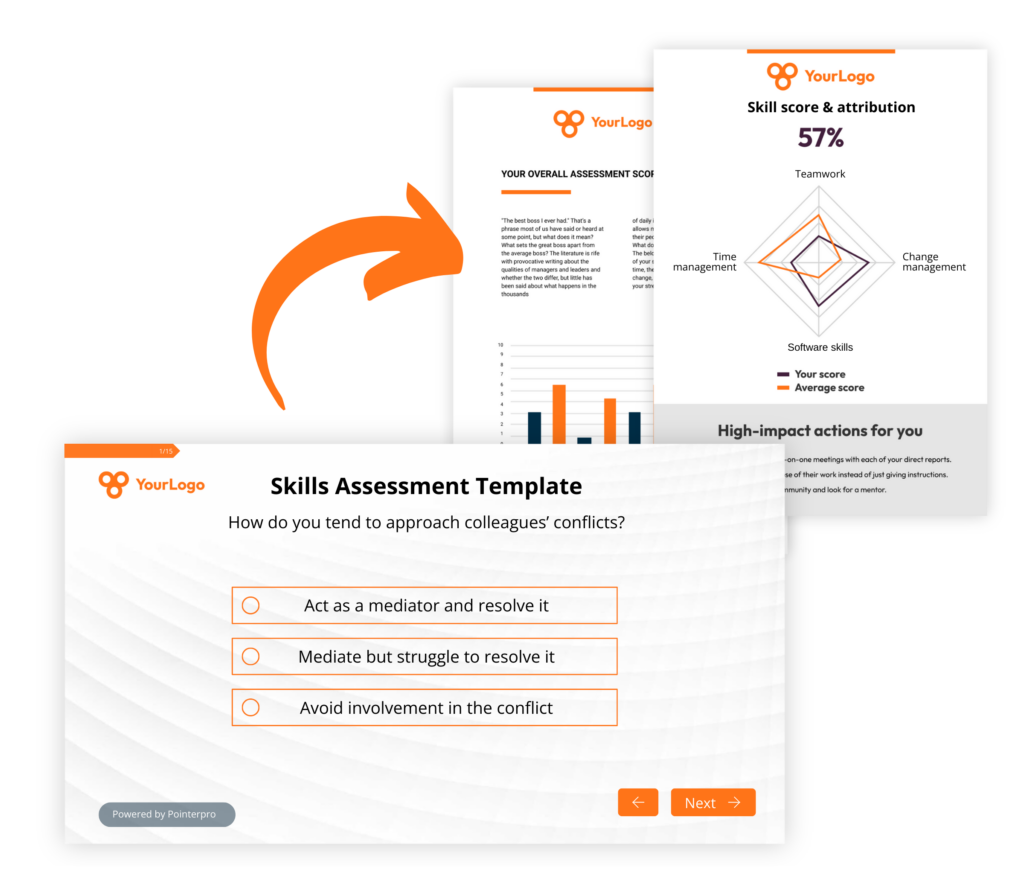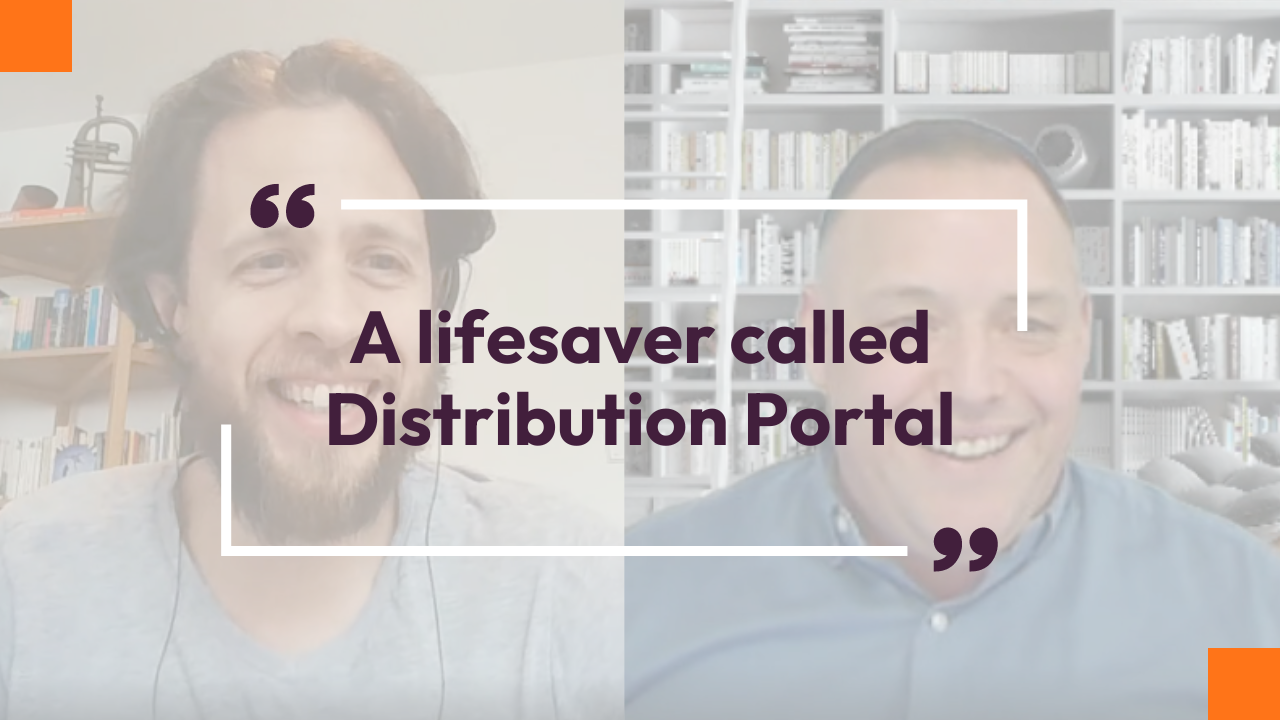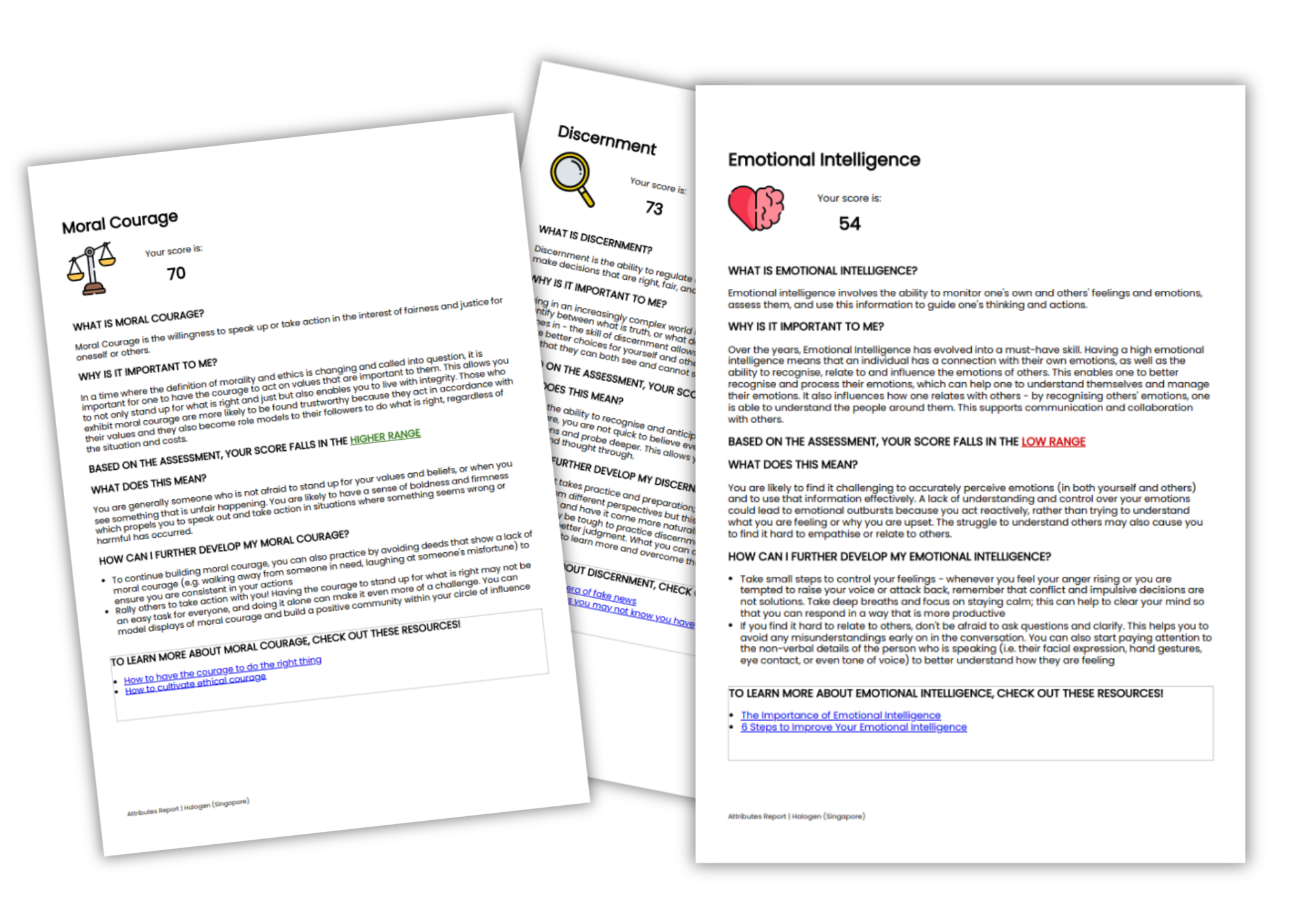Skills assessment template
What if you could build a skills assessment tool to assess and advise anyone, accurately and objectively?
Skills assessments determine the strengths and weaknesses of individuals so you can hire and/or train accordingly.
Pointerpro is the 2-in-1 software that combines assessment building with personalized PDF report generation.

What is a skills assessment?
In the world of work, consulting, and coaching, skills assessments are the compass guiding individuals and organizations toward their goals. A skills assessment evaluates a person’s competencies, capabilities, and knowledge, aligning them with professional objectives.
Whether you’re a professional seeking career growth, a consultant providing expert advice, or a coach helping clients reach their full potential, skills assessments are invaluable. They empower you to identify strengths, bridge gaps, and chart a path toward success, making them an indispensable tool in the pursuit of excellence.
In today’s fast-paced digital age, the convenience and effectiveness of online skills assessments cannot be overstated. With the right skills assessment template, you can streamline an employee development process by providing instant feedback and comprehensive performance analytics
3 reasons to use Pointerpro as a skills
assessment tool?
Interactive user experience
With the Questionnaire Builder you get to create an engaging assessment. How? With numerous design and layout options, useful widgets and countless question types.
Refined, score-based analysis
Our custom scoring engine helps you quantify different skills in your assessment. The result? An objective and very nuanced assessment of your respondents’ situation.
Automated feedback in PDF
Thanks to your setup in the Report Builder, respondents instantly get a detailed PDF report: with helpful charts, a personalized analysis of risks, and actionable tips.
1.500+ businesses worldwide build assessments with Pointerpro









How to write a skills assessment (no Excel template)?
Creating a real skills assessment involves a thoughtful and structured approach to evaluate an individual’s or a group’s competencies and knowledge in a specific area. Here’s a step-by-step guide on how to create a skills assessment template:
- Define the purpose and scope: Determine the purpose of the skills assessment. Are you assessing skills for hiring, employee development, training, or certification? Also identify the specific skills or competencies you want to assess. Be clear about what the assessment will cover.
- Design assessment criteria: Break down each skill or competency into measurable criteria. What specific aspects or sub-skills should be evaluated? Define clear performance indicators for each criterion. These could be on a scale (e.g., 1 to 5) or in a descriptive format (e.g., "poor," "satisfactory," "excellent").
- Create assessment questions: Develop questions, or scenarios that align with the criteria for each skill. These can be presented in the form of multiple-choice questions, open-ended questions, and matching questions. Ensure the questions or tasks are relevant, clear, and free from bias.
- Set a scoring system:Determine how you will score the assessment. Assign points or ratings to each response or task completion based on the established criteria. Define what constitutes a passing or proficient score for each skill. Also, consider scoring different question groups so that your skills assessment feedback can pinpoint diverse weaknesses and strengths.
- Develop your assessment: Create the assessment questionnaire using online assessment software. It’s recommended to choose an assessment tool that can automatically generate personalized feedback for each respondent.
- Organize a pilot test: Before implementing the assessment, conduct a pilot test with a small group to identify any issues with the assessment questions or tasks. This helps refine the assessment for the main audience.
- Distribute the assessment: Prepare the communication to the individuals you want to take the assessment. If your assessment platform allows it, schedule administering the assessment to the different respondents. Be sure to provide clear instructions and guidelines on how to complete the assessment.
After you’ve followed these steps, you have your minimum viable skills assessment template that you can start to develop in a tool like Pointerpro. Consider the development of your skills assessment as an ongoing process, as required skills and competencies evolve over time.
Skills assessment vs. competency assessment: What are the differences?
In the world of employment and talent development, two terms that often arise are “skills assessment” and “competency assessment.” While these concepts are closely related and share common objectives, they have distinct differences in their focus, scope, and application.
Let’s delve into what sets a skills assessment apart from a competency assessment, clarifying its purposes and implications.
Skills assessment template:
A skills assessment primarily evaluates an individual’s specific, tangible abilities and proficiencies in performing particular tasks or activities. It is centered on the practical application of knowledge and techniques. Skills assessments are highly specific and focus on the “how” aspect of performing tasks, leaving little room for interpretation or subjectivity.
Key characteristics of skills assessments:
- Task-oriented: Skills assessments measure a person's ability to execute specific tasks or functions. These tasks can be technical, such as language skills, or soft, like communication.
- Tangible and observable: Skills are concrete and observable, making them quantifiable and less prone to ambiguity. For instance, a welding skill assessment might measure the welder's ability to join metals accurately.
- Performance-based: Individuals are typically required to demonstrate their skills through practical tasks, simulations, or hands-on activities. The focus is on "showing" rather than "telling."
- Measurable: Skills assessments always tend to involve a scoring system or rubric that objectively measures the level of proficiency or mastery, typically on a scale.
- Practical and applicable: The results of skills assessments are directly applicable to job-related tasks and responsibilities.
Competency assessment template:
Competency assessments, on the other hand, have a broader focus, encompassing a range of attributes and characteristics that go beyond mere skills. Competencies encompass skills but also include knowledge, behaviors, and personal qualities. They assess an individual’s overall capability to perform effectively in a given role, often considering the “what” and “why” aspects of tasks.
Key characteristics of competency assessments:
- Holistic: Competency assessments evaluate a person's overall ability to perform in a particular role, taking into account not only skills but also knowledge, behaviors, and attitudes.
- Adaptable and transferable: Competencies are often transferable to various contexts and roles. For instance, communication competency is valuable in multiple professions.
- Behavior-oriented: Competency assessments may include evaluating an individual's behavioral traits, such as adaptability, leadership, or teamwork.
- Not always measurable:While some competencies can be measured using specific indicators, others are less tangible and may require qualitative assessments. Behaviors and attitudes can be subjective and context-dependent.
- Role-centric: Competency assessments are particularly relevant in job roles that demand a wide range of attributes, such as management or leadership positions.
Why it matters:
Understanding the difference between skills and competencies is crucial for various applications:
- Hiring and recruitment: When hiring for a position, employers should decide whether they need candidates with specific skills or a broader set of competencies.
- Employee development: In talent development, organizations may focus on improving skills for technical roles and enhancing competencies for leadership positions.
- Training and education: Educational institutions and training programs tailor their curriculum based on whether they aim to impart skills, competencies, or both.
- Performance evaluation: SWhen assessing employee performance, it's essential to distinguish between the skills required for a role and the broader competencies that contribute to overall success.
30 skills assessment example questions
Here are 30 of the best skills assessment example questions divided into 3 similar but distinct categories:
- 10 employee skills assessment example questions
- 10 soft skills assessment example questions
- 10 thinking skills example questions
10 employee skills assessment example questions
- Describe a situation where you had to communicate complex information to a non-technical audience. How did you ensure they understood the message?
- Provide an example of a work-related problem or challenge you faced. How did you approach it, and what was the outcome?
- What software or tools are you proficient in, and how have you used them to enhance your work or projects?
- Tell us about a time when you had to work closely with a team to accomplish a common goal. What role did you play, and how did you contribute to the team's success?
- Describe a situation where you had to take the lead on a project or task. How did you make decisions, delegate responsibilities, and ensure the project's success?
- How do you manage your time and prioritize tasks when faced with multiple deadlines or competing demands?
- Share an example of a difficult customer interaction you handled successfully. How did you resolve the issue and ensure customer satisfaction?
- Can you describe a situation where you had to adapt to unexpected changes or challenges at work? How did you respond, and what did you learn from the experience?
- Tell us about a time when you had to mediate a conflict between co-workers. How did you approach the situation, and what was the outcome?
- Provide an example of a project or task where you had to analyze data or information to make informed decisions. What steps did you take, and what were the results?
These skills assessment template questions encourage employees to reflect on their performance, achievements, challenges, and areas for growth, fostering self-awareness and facilitating discussions with their managers about how to enhance their performance in the future.
10 soft skills assessment example questions
- Communication skills: Can you provide an example of a situation where effective communication was crucial to the success of a project or task? How did you ensure clear and efficient communication?
- Teamwork and collaboration: Describe a project where you had to work closely with a diverse team. How did you handle any challenges related to teamwork, and what was the outcome?
- Problem-solving: Share a scenario in which you encountered a complex problem at work. How did you approach it, and what steps did you take to find a solution?
- Adaptability and flexibility: Tell us about a time when you had to adapt to a significant change in the workplace. How did you handle it, and what did you learn from the experience?
- Conflict resolution: Can you provide an example of a conflict you successfully resolved with a coworker or team member? How did you approach the situation, and what was the result?
- Leadership and influence: Describe a situation where you took a leadership role, even without a formal title. How did you inspire and motivate others to achieve a common goal?
- Time management and prioritization: How do you manage your daily tasks and prioritize your workload to ensure you meet deadlines? Can you share a specific strategy or approach?
- Customer service and interpersonal skills: Share an example of a customer interaction where you had to handle a challenging situation. How did you empathize with the customer and resolve their issue?
- Stress management: How do you cope with work-related stress and pressure? Can you describe a situation where you effectively managed stress to meet a deadline or accomplish a task?
- Critical thinking and decision-making: Provide an example of a work-related decision that required critical thinking. How did you evaluate the options and make the final choice, and what was the impact?
These skills assessment template questions are designed to assess a range of soft skills, including communication, teamwork, problem-solving, adaptability, conflict resolution, leadership, time management, customer service, stress management, and critical thinking. Adjust them as needed to suit the specific soft skills you want to evaluate in a soft-skill focused employee skills assessment.
10 thinking skills example questions for management positions
- Critical thinking: Can you provide an example of a situation where you needed to evaluate the credibility of information or data before making a decision? How did you approach this task?
- Analytical thinking: Describe a project or task where you needed to analyze complex data or information. How did you break down the problem and draw meaningful insights from it?
- Strategic thinking:Share an instance where you had to develop a long-term strategy or plan to achieve a specific business goal. What steps did you take to ensure its success?
- Creative problem-solving: Tell us about a time when you had to come up with an innovative solution to a challenging problem. How did you generate creative ideas and implement them?
- Critical decision-making: Provide an example of a decision you had to make under significant pressure or uncertainty. How did you weigh the options and arrive at a well-informed choice?
- Risk assessment: Can you describe a situation where you had to assess potential risks associated with a project or initiative? How did you identify and mitigate these risks?
- Data-driven decision-making: Share an instance where you made a decision based on data and analytics. What data sources did you use, and how did they influence your choice?
- Systems thinking: Describe a project that required you to consider the interconnected elements and impacts within a larger system. How did you ensure that all aspects were addressed?
- Innovative thinking: Provide an example of a time when you introduced a new idea or approach to improve a process or achieve better results. How did you foster innovation?
- Ethical decision-making: Tell us about a situation where you faced an ethical dilemma at work. How did you navigate the ethical challenges and make a principled decision?
These concise employee skills assessment template questions are designed to gather multiple-choice responses from people applying for managerial positions, allowing for a quick and quantifiable evaluation.
The questions cover important aspects of team management, including performance, delegation, conflict resolution, team culture, skill development, goal achievement, feedback, leadership development, adaptability, and future plans. The goal is to assess a team manager’s practices and identify areas for improvement.
What Pointerpro clients are saying




What is a skills matrix and why is it important?
A skills matrix, also known as a skills inventory or competency matrix, is a skills assessment template in the form of a structured overview, used to assess and document the skills, competencies, and knowledge of individuals within an organization.
It is typically presented in a matrix format where employees or team members are listed on one axis, and the skills or competencies required for their roles are listed on the other. Each cell in the matrix indicates the level of proficiency or mastery an individual possesses for a specific skill or competency.
The importance of a skills matrix lies in several key areas:
- Resource management: A skills matrix allows organizations to identify the skills and competencies available within their workforce. This information is essential for efficient resource allocation, ensuring that the right individuals are assigned to projects or tasks that match their expertise.
- Gap analysis: By comparing the skills matrix against the skills and competencies needed for current or future projects, organizations can identify skill gaps. This information informs recruitment, training, and development efforts to address these gaps and enhance overall team performance.
- Succession planning: A skills matrix aids in succession planning by highlighting potential successors for critical roles. It ensures that there are individuals with the necessary skills and knowledge to step into key positions when needed.
- Training and development: For employees, a skills matrix serves as a tool for setting individual development goals. It helps employees and their managers identify areas where improvement or upskilling is required, leading to more targeted training programs and career growth.
- Performance evaluation: Skills matrices provide a structured framework for performance evaluations. They offer objective criteria for assessing employee performance and growth, making performance reviews more data-driven and fair.
- Project team formation: When assembling project teams, a skills matrix ensures that the team members possess the requisite skills and competencies, improving project efficiency and reducing the risk of task redundancy.
- Risk mitigation: Having a clear overview of the skills within the organization reduces the risk of over-dependence on a single individual for critical tasks. It ensures that skills are distributed across the team, reducing vulnerability to unforeseen circumstances.
- Compliance and certification: In certain industries, skills matrices are essential for demonstrating compliance with regulatory requirements or industry standards. They help organizations show that their workforce possesses the necessary skills to meet these standards.
In summary, a skills matrix is a valuable management tool that provides a comprehensive overview of the skills and competencies within an organization. It plays a crucial role in resource management, performance evaluation, and strategic planning, helping organizations and employees make more informed decisions and achieve their goals efficiently.
An online skills assessment is essential to retrieve the data to set up a comprehensive skills matrix for any organization.
Conclusion
Skills assessment and more precisely “employee skills assessments” help employers hire candidates more effectively with the right skill sets required for the job. But also beyond the context of hiring and recruitment, the skills assessment template is an essential starting tool for anyone managing talent or skills in an organization.
Create your first skills assessment today
You may also be interested in
Recommended reading

Vlerick Business School digitalizes entrepreneurship development with Pointerpro [case study]
What do a top-tier international business school based in the capital of Europe and Pointerpro have in common? At the

Attain Global: How to do psychometric tests right and build a cutting-edge international business [case study]
In many countries worldwide, the pursuit of skillful and engaged employees is not so much a war on talent as

How youth development specialist Halogen reaches thousands of young Singaporeans with Pointerpro [case study]
Singapore, in Southeast Asia, is a global, economic powerhouse with a population of a little less than 6 million people.


